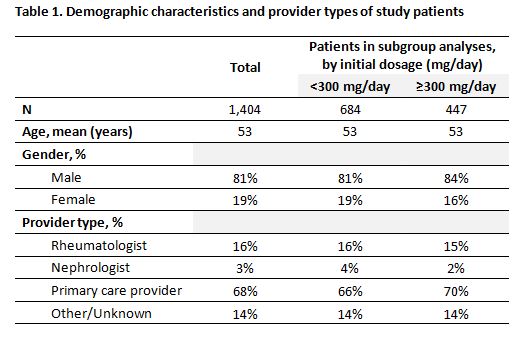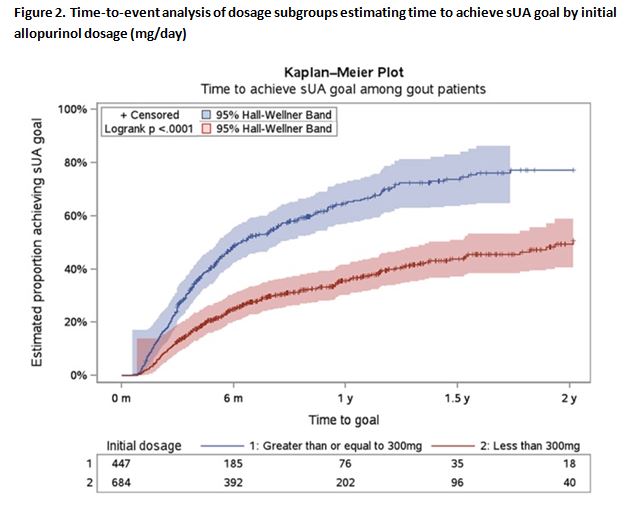Session Information
Session Type: ACR Poster Session B
Session Time: 9:00AM-11:00AM
Background/Purpose: Urate-lowering therapy (ULT) is essential in chronic gout management. For decades, allopurinol has remained the most frequently prescribed ULT. Reaching a goal of serum urate (sUA) level of <6.0 mg/dL has been suggested by gout management guidelines. However, limited studies have reported time duration needed to reach the sUA goal among allopurinol users. The aim of this study was to estimate time for allopurinol-treated gout patients to reach sUA goal.
Methods: This retrospective study used the Truven Health MarketScan® Database (Commercial). Study cohort included patients with a gout diagnosis during the study period (2010-2015), ≥1 allopurinol prescription fill during 2011-2015 (intake period, the earliest allopurinol date as index date), ≥90 days of allopurinol continuous therapy, ≥2 sUA results (the first sUA test was within 90 days before and 30 days after the index date; the second sUA test was after first sUA test and index date), aged ≥18 years on index date. Prevalent allopurinol users (allopurinol prescription fill during 1 year prior to index date) were excluded. Time duration to sUA goal was estimated from index date until reaching sUA goal of <6.0 mg/dL. Patients not reaching sUA goal were followed until end of therapy, health plan disenrollment, or end of 2015, whichever came first (censor date). Patient characteristics included age, gender, provider specialty, and initial dosage (ID) at the index date (used in subgroup analysis). Survival analyses of Kaplan-Meier estimators and unadjusted Cox proportional hazards regression model were conducted.
Results: There were 1404 patients included in the study cohort (Table 1) with a median time of 8 months to sUA goal (Figure 1). Stratifying by ID, the proportions of patients reaching sUA goal in 1 and 2 years were 36% and 49% with ID <300 mg versus 65% and 77% for patients with ID ≥300 mg (Figure 2).
Conclusion: Patients with gout who do not reach goal within 1 year using allopurinol, regardless of initial dosage, are unlikely to reach goal in the next year and therefore may benefit from additional treatment.
To cite this abstract in AMA style:
Lim JJ, Fu AC, Giordano J, Reasner DS, Taylor DCA. Allopurinol Treatment for Gout: How Long to Reach Serum Urate Goal? [abstract]. Arthritis Rheumatol. 2017; 69 (suppl 10). https://acrabstracts.org/abstract/allopurinol-treatment-for-gout-how-long-to-reach-serum-urate-goal/. Accessed .« Back to 2017 ACR/ARHP Annual Meeting
ACR Meeting Abstracts - https://acrabstracts.org/abstract/allopurinol-treatment-for-gout-how-long-to-reach-serum-urate-goal/



